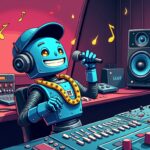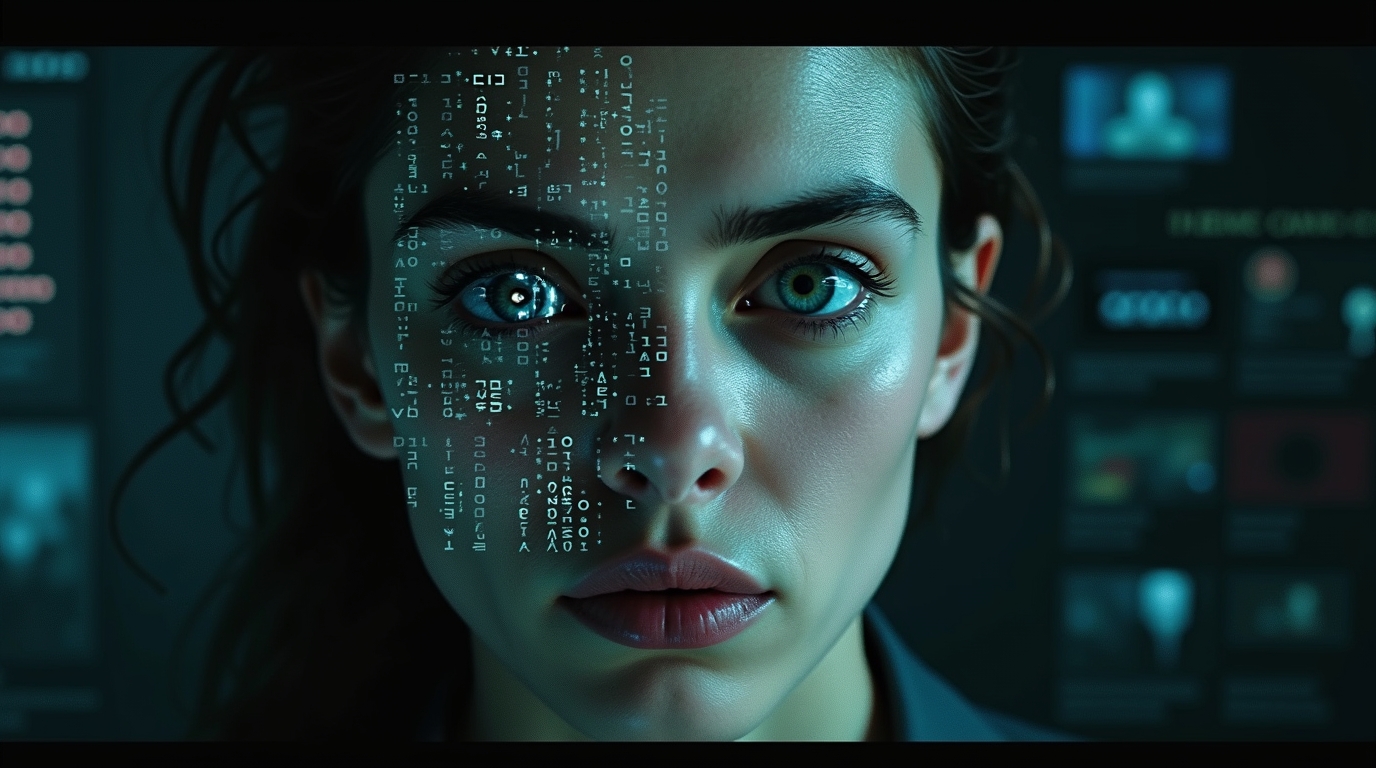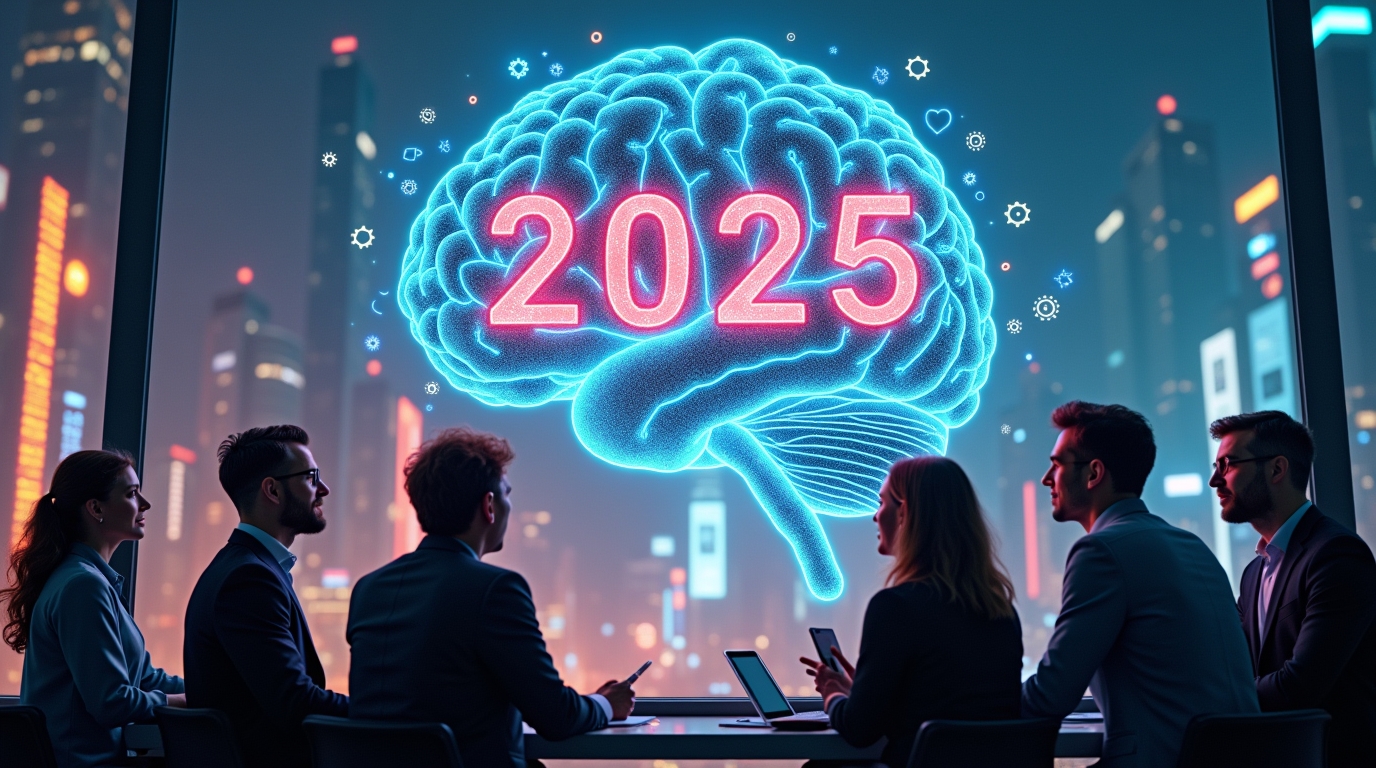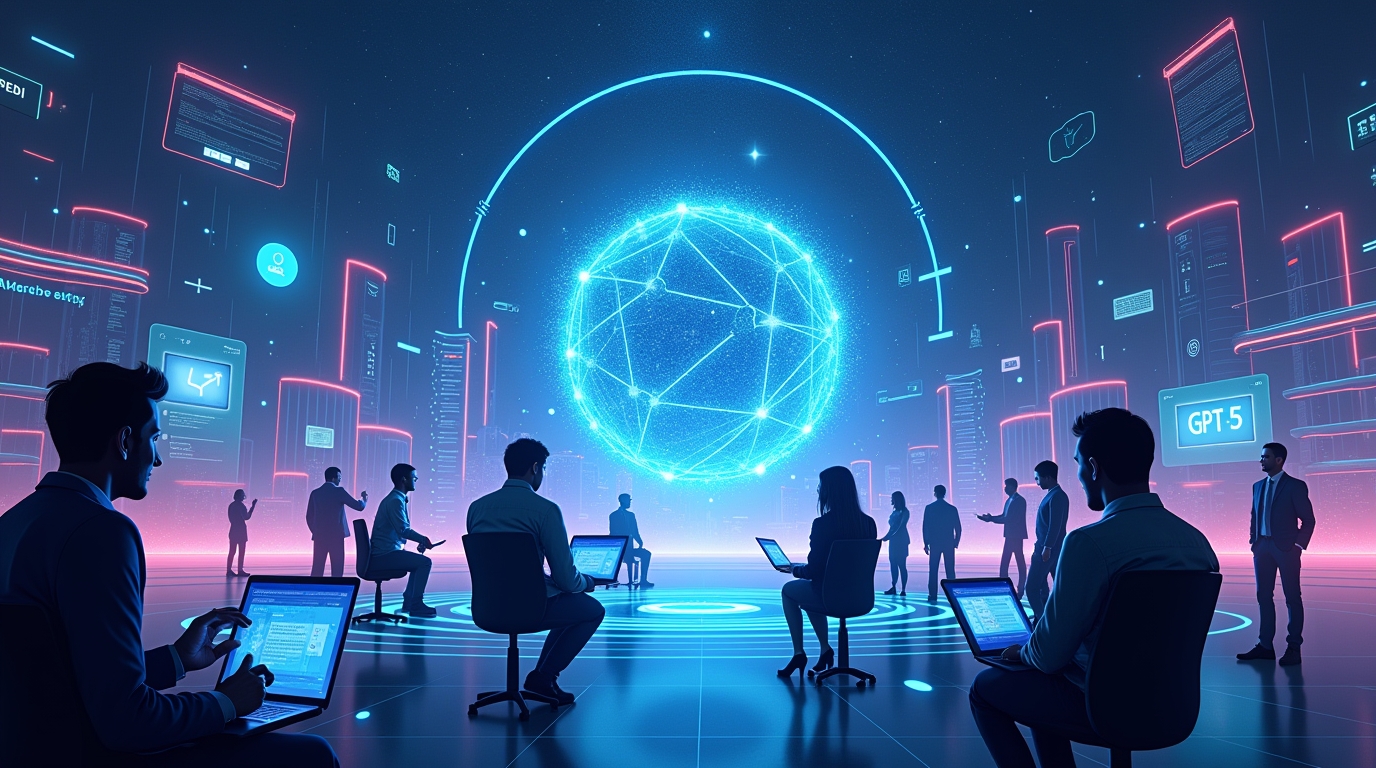Introduction Background: beyond the Hype and Headlines
The question has been reverberating through boardrooms, living rooms and social media timelines year in, year out, and it has often been sarcastically framed thus: Is your job in danger of being replaced by AI? It is a question that raises equal parts of concern and interest. It alternates between gloomy assertions that AI will render many workers jobless to feverish dreams of a four day work week and AI assistants. Will AI Replace Your Job? New 2025 Data Exposes the Real Impact.
In 2025, however, that guesswork becomes fact. The hype has died down and we are here with the real workable results of artificial intelligence on the world of work. The discussion is no longer a dichotomous either/or; it is a multilateralised discourse of upheaval, change and productivity.
This article goes through in-depth newest 2025 statistics by major research companies to distinguish fact and fiction. We will go beyond the frightening headlines and present the true effect that AI has on your career. We will look at the jobs that are most likely to be automated, what sectors to work with and, what is most important, what skills you should develop in order not to just survive, but to achieve great success in the new world of work. The future is not about man versus machine; it is man as an augment with machines.
What the figures really mean How to succeed in the 2025 environment

To see the actual effect, we have to refer to the forecasts of the most authoritative organizations of the world. The story that they tell is one of vast change, though not an apocalypse of fear. “This was just the beginning – uncover more AI secrets in our expert-curated guides at AI Smartly.
A groundbreaking 2024 report by the World Economic Forum (WEF), The Future of Jobs Report 2024, surveyed over 800 companies that employ 11 million workers around the world. They also anticipate an overall positive impact of AI on jobs with the average effects concerning a third (36 percent) of workers being net positive over the next ten years. It says that automation and AI will probably eliminate 85 million jobs worldwide, but, at the same time, they are also likely to generate 97 million new jobs- a net gain of 12 million jobs.
Equally, a McKinsey Global Institute research paper indicates that as much as 30 percent of the currently worked hours across the US economy could be automated by 2030. They however indicate that these will be accompanied by an increase in new and in some cases more better skilled jobs. The main lesson? Research.си very large numbers. The breaking up will rather churn the labor market than contract it
This 2025 data reveals what the actual impact is: not mass replacement but mass transformation. The goalposts are shifting. Jobs won’t just disappear; they will evolve, requiring a new synergy between human intuition and machine efficiency.
List of the Most-Exposed to AI Automation Jobs (and why)
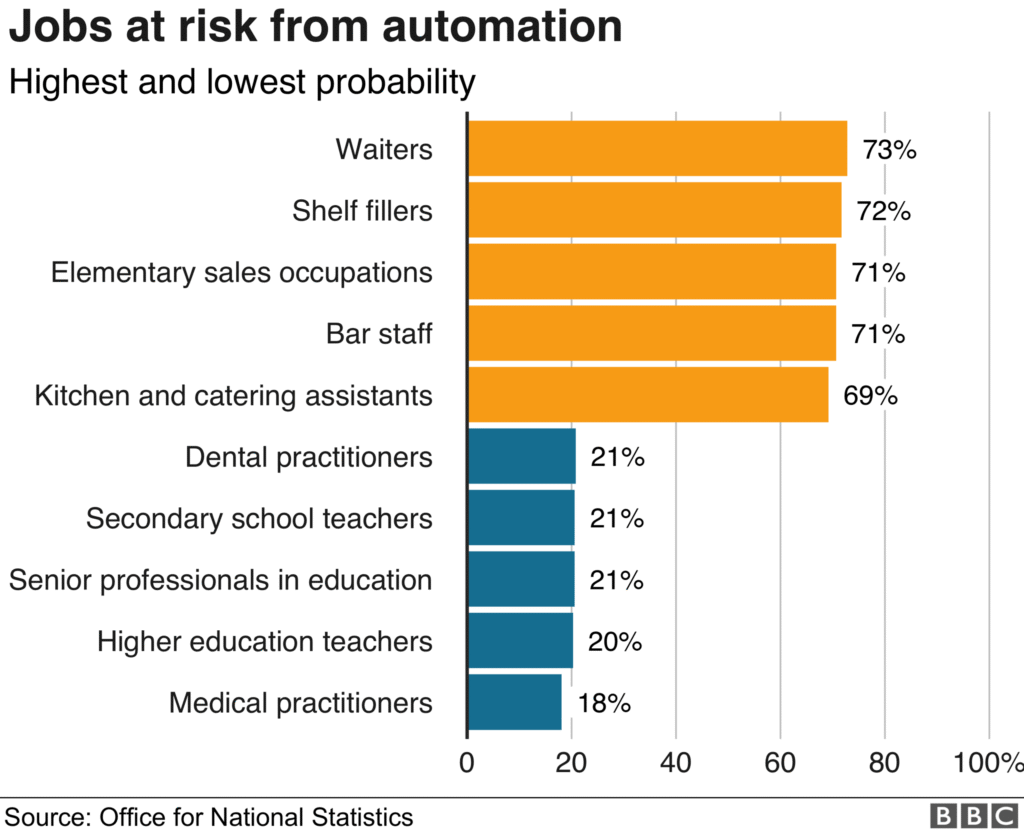
It is agreeable that, some jobs and tasks are more vulnerable to automation. AI is particularly good at the pattern recognition, data processing and predictable physical tasks. The WEF cites Forrester Research figures to demonstrate that the jobs with the greatest level of transformation include high volumes of standard and routine duties.
Data-Clerical Jobs: Book- keeping clerks, Customer care reps responding to routine requests, Data entry clerks, administrative assistants. Invoice processing, data organization, and scheduling can be performed by AI-powered software with a higher degree of speed and accuracy.
Repetitive Manufacturing and Production: The roles that offer predictable physical tasks in an assembly-line are being more streamlined by the action of robotics and AI-driven systems.
Some white-collar positions are not always safe. As an example, document review in legal research, low-level financial analysis, and even low levels of software code generation can be complemented and automated by systems such as GPT-4o and Claude 3.
The similarity is not the so-called intelligence of the work, but its predictability. When a task can be performed in accordance with the set of clear rules and processes, it is an excellent possibility to provide AI augmentation.
The Unsafe Haven: no Industry is Fully Immune
A widespread misunderstanding is that all that is under threat are the low-skill jobs. As indicated in the 2025 data, the resulting effect is vertical in the sense that it will affect all fields, including creative arts to corporate law.
Tech: The tech industry is also applying AI in the development of AI by automating code testing, generating boilerplate code, and stream basing DevOps pipelines.
Legal: Contract analysis, due diligence and legal research is being shifted by legal AI tools, like Harvey AI, which are making a difference to how paralegals and junior lawyers undertake their day to day tasks.
Healthcare: AI is transforming diagnostics (analysis of MRIs and X-rays), which affects the process of work of radiologists, and administrative processes are being carried out automatically.
Creative & Marketing: Generative AI in text (Jasper, Copy.ai), images (Midjourney, DALL-E 3), and video (Synthesia) is disrupting content creation, advertising and graphic design. It is not taking over all creatives, however, it is changing the type of skill set needed.
The moral is simple complacency is the devil. No matter what profession you are in, ongoing learning and adaptation has become requirements of a career life skills.
This is the human advantage Jobs AI can not take (yet).

Machines can be enhanced; nevertheless, they cannot compete with humans. Here are the biggest opportunities The safest and the ones that will experience the most growth are those which work with the strengths of human beings.
- Jobs That Need Emotional Intelligence (EQ): Occupations such as mental health therapists, nurses, teachers, senior managers, as well as others, must possess empathy, subtle non-verbal sensitivity, communication and human connection, which AI will not be able to rival.
- Creative and Strategic Thinking: AI is creative, in the sense that it is able to create content. However, the content is not truly original, creative or able to foresee complex and multidimensional business strategies. Research scientists, creative directors and CEOs will continue to be highly demanded.
- Complex Problem Solving in Unpredictable Environments: Plumbers, electricians, frontline emergency responders and skilled tradespeople inhabit dynamic and unpredictable physical molten Earth environments that are exceptionally challenging to automate.
- Interpersonal Relationships and Persuasion: Sales directors, negotiators and business development managers are people who cannot be successful without building trust and rapport, and this is a highly human skill.
The 2025 report of the actual outcome shows that the future of work will be in the hands of those who can learn and adopt the soft skills and employ AI as an aid to their unique human abilities.
The New Hybrid Workforce: A Merger, Not A Reconstruction

Replacement is not the best model to predict the future but partnership is. We are shifting to a hybrid workforce of man and machine historically linked to one another.
Consider a physician accessing an AI-controlled decision tool to validate his/her opinion that will mean she can spend more time with the patient. Or a marketing manager checking an AI to analyze campaign data and create 100 A/B test headlines, and then fine-tuning them and incorporating her brand knowledge to them. The human provides the oversight, strategy and the creative spark, with the heavy lifting of data crunching being done by the AI.
Such unison increases productivity and enables humans to concentrate on more gratifying and of more value in their jobs. Below is what Satya Nadella, the CEO of Microsoft, had to say, The key is not to think of AI as a replacement to humans but amplifying human ingenuity.
Future Proofing Your Career: The essential skills for 2025 and Beyond
And what can you do today that will help halfway to tomorrow? The numbers speak volumes adaptability is your key to success. The following are the most important skills to develop:
- You do not have to be a programmer, however, you should understand how to employ AI tools used in specific areas of interest. It could be ChatGPT to write, Notion AI to manage projects, Otter.ai to transcribe, and more. The bottom line is getting to know these tools.
- Critical thinking and analysis: The skill of questioning what AI tells you, recognizing bias, interpreting information and making sensible decisions has become increasingly important.
- Creativity and Innovation: High degree of creative ideation, story telling and conceptual thinking beyond what can be accomplished with generative AI.
- Emotional and Social Intelligence: Hone abilities, such as leadership, teamwork, empathy and negotiation.
- Active learning: Take an ongoing approach to learning Be proactive on taking online courses on platforms like Coursera or linkedIn Learning to be at par with the current generation.
The real Endorsement is Empowerment. Drawing a conclusion, we find that this is exactly how it is, real endorsement is empowerment.
Users are also wonderific, so, will AI steal your job? The complexity comes out in the new 2025 figures: it is mixed. Inevitably, IA will take over certain tasks, rendering most job descriptions obsolete In their stead are new, oftentimes more human-friendly functions.
Do not turn to fear and reject adaptation to it, the greatest threat is not AI itself. It is not the story of the future as human versus machine conflict. It is a tale of partnership, as AI is a potent technology that can leverage human capability and relieve people of tedious tasks to achieve greater creativity and innovation.
The question you should be asking is no longer *”Will AI replace me?”* but *”How can I use AI to replace the parts of my job I don’t like, so I can focus on what I do best?”* The future belongs to those who can answer it.
Email: adil.taskthegroup@gmail.com


